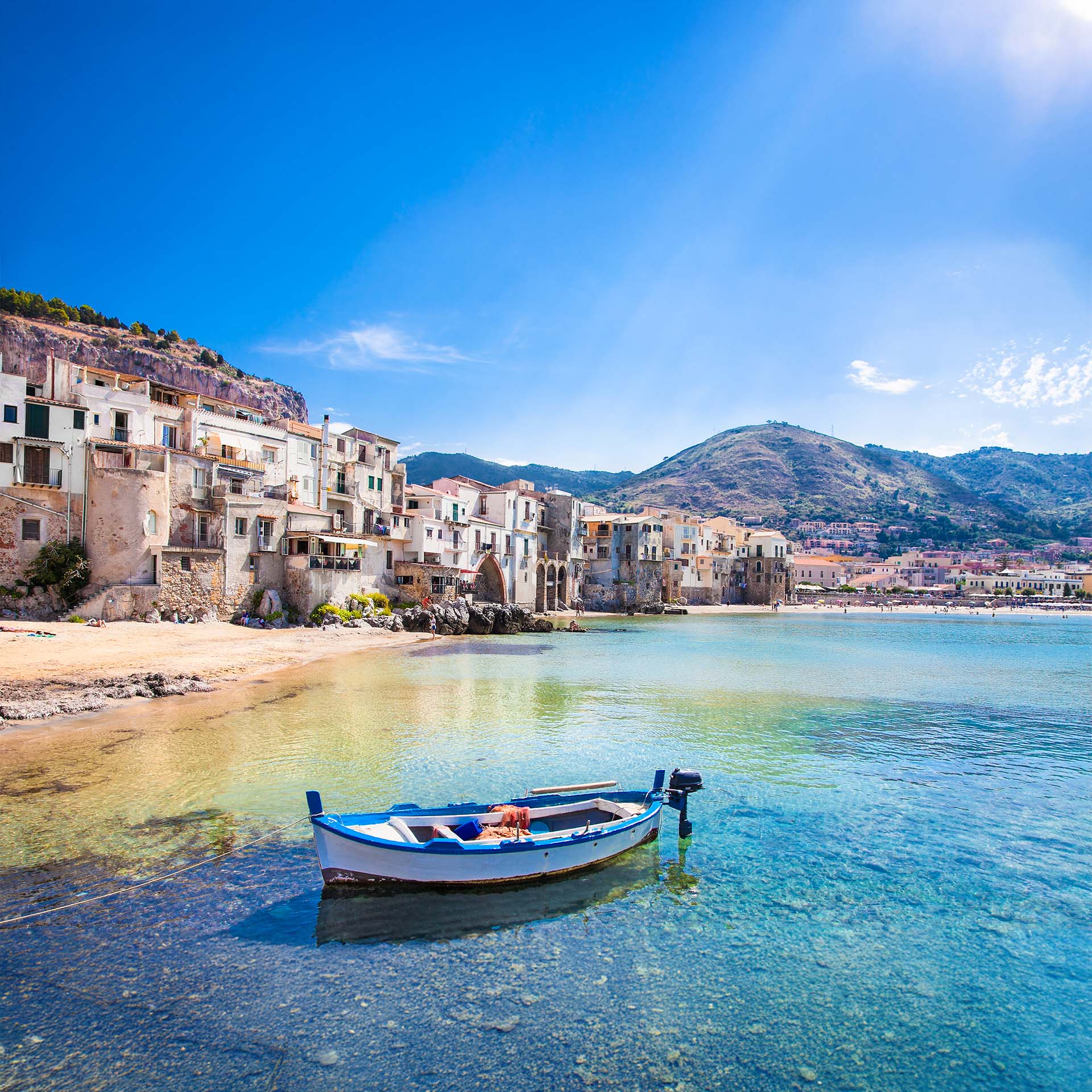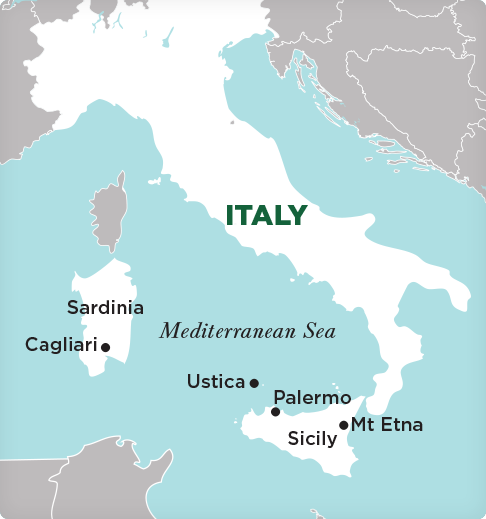Credits
16
Prerequisites
None
Language of Study
Italian
Courses taught in
English
Dates
Jan 26 – May 10
Program Countries
Italy
Program Base
Palermo, Italy
Visa
Required
Critical Global Issue of Study
Climate & Environment

Explore marine and coastal ecology and the unparalleled biodiversity of Sicily and Sardinia. Island biodiversity hotspots in Sicily and Sardinia provide unique insights into ecological adaptation, conservation challenges, and sustainable solutions.
16
None
Italian
English
Jan 26 – May 10
Italy
Palermo, Italy
Required
Climate & Environment
From the volcanic landscapes of Mount Etna to the ancient cork oak forests of Sardinia, this program provides a living laboratory for studying biodiversity, endemism, and ecological adaptation. In the Mediterranean’s two largest islands, Sicily and Sardinia, you’ll investigate how geographic isolation shapes unique ecosystems and examine how centuries of human-environment interactions illuminate current conservation challenges.
Your base will be Palermo, Sicily’s largest urban center, known for its rich cultural heritage and access to diverse ecosystems. You’ll also spend time in Cagliari, Sardinia, where you’ll investigate coastal management, wetland restoration, and sustainable resource practices in cork oak forests. Throughout both locations, expert guest lectures from researchers at the Universities of Palermo and Cagliari, along with local community partners will provide insights into ongoing conservation projects.
Throughout the program, you’ll engage in hands-on field research, comparing local perceptions of environmental change with long-term data. The program addresses both STEM and social science interests through its multi-scale approach to understanding climate, ecology, and human societies. Key topics include marine and coastal ecology, sustainable agriculture, and the challenges of conservation in the face of climate change and tourism. You’ll also explore traditional ecological knowledge in the Madonie mountains, where communities maintain centuries-old harvesting techniques, and learn about innovative technologies in climate-smart agriculture.
None


In Sicily, you will explore geographically significant sites:
In Sardinia, you’ll visit incredible sites:
Please note that SIT will make every effort to maintain its programs as described. To respond to emergent situations, however, SIT may have to change or cancel programs.
Upon completion of the program, students will be able to:
The following syllabi are representative of this program. Because courses develop and change over time to take advantage of dynamic learning opportunities, actual course content will vary from term to term.
The syllabi can be useful for students, faculty, and study abroad offices in assessing credit transfer. Read more about credit transfer.
Mediterranean Island Ecosystems
Geographic isolation shapes species distribution, evolution, and diversity across island habitats. This course examines these phenomena through field experiences in Sicily and Sardinia, where Mediterranean isolation has created unique ecological laboratories. Students investigate how factors like island size, mainland distance, and geological history influence species colonization and adaptation. The course explores the intersection of natural processes with millennia of human presence, creating complex socio-ecological systems. Through engagement with local communities, students discover how island characteristics shape both biological and cultural diversity, informing conservation efforts amid climate change.
Choose between the following two courses:
Technology-Driven Solutions for Mediterranean Ecosystems
This solutions-oriented course explores innovative strategies addressing Mediterranean island ecosystem challenges through immersive fieldwork in Sicily and Sardinia. Students engage with issues including water scarcity, soil degradation, and biodiversity loss. Technology is approached as applied knowledge to enhance ecological wellbeing. Learning from researchers and conservation professionals, students experience data-driven decision-making and emerging technologies that support ecosystem health, gaining firsthand exposure to science-based solutions.
OR
Community-Driven Sustainability on Mediterranean Islands
Island communities face distinct environmental challenges: increasing water scarcity, changing rainfall patterns, soil degradation, and coastal erosion. Yet these island communities also hold centuries of local knowledge about living sustainably in Mediterranean landscapes. Through engagement with farmers maintaining ancient groves, and communities managing shared water resources, students learn how local practices maintain environmental balance in fragile island ecosystems. Through direct participation in community initiatives, we examine how local knowledge can inform approaches to current environmental challenges.
Italian I
(ITAL 1003/3 credits)
Italian II
(ITAL 2003/3 credits)
Italian III
(ITAL 3003/3 credits)
Emphasis on speaking and comprehension skills through classroom and field instruction. Students are placed in beginning or intermediate classes based on in-country evaluation, including oral proficiency testing.
Environmental Research Methods and Ethics
The Environmental Research Methods and Ethics seminar equips students for research in Mediterranean island ecosystems. It covers marine-terrestrial interactions, conservation challenges, and human-environment dynamics. Students gain hands-on field experience, learn ecological and social science research techniques (including community-based approaches), and develop independent research projects. The course addresses research ethics, IRB processes, and cultural considerations for Mediterranean communities, preparing students for their Independent Study Project or Internship.
Choose between the following two courses:
Independent Study Project
(ISP 3000/4 credits)
The Independent Study Project is conducted in an approved location appropriate to the project in Italy.
OR
Internship & Seminar
(ITRN3000/ 4 credits)
This seminar consists of a four-week internship with a local community organization, research organization, local or international NGO in Italy. The aim of the internship is to enable the student to gain valuable work experience and to enhance their skills in an international work environment. Students will complete an internship and submit a paper in which they process their learning experience on the job, analyze an issue important to the organization, and/or design a socially responsible solution to a problem identified by the organization.



SIT Study Abroad is committed to ensuring that international education is within reach for all students. We believe in the transformative power of immersive, intercultural experiences and are dedicated to supporting students in their educational journey.
See All Costs
A critical step in preparing for your study abroad program is planning how you will maintain your health and wellbeing. Please review the following information carefully and contact [email protected] with any questions or concerns.
Learn More
Students are required to obtain a visa for this program. Your admissions officer will provide you further guidance on the process and support documents. Please do not apply without instructions from your admissions officer.